Combining fuel cells with batteries for home energy creates a powerful synergy that enhances efficiency, reliability, and sustainability. You'll benefit from constant power generation via fuel cells, while batteries manage sudden demand spikes and store excess energy. This setup reduces grid dependence, lowers your carbon footprint, and offers long-term cost savings. It's scalable to fit various home sizes and integrates well with smart grid systems. The hybrid approach maximizes each technology's strengths while minimizing weaknesses, providing a robust energy solution that adapts to your needs. Explore further to uncover the full potential of this innovative home energy system.
Understanding Fuel Cell Technology
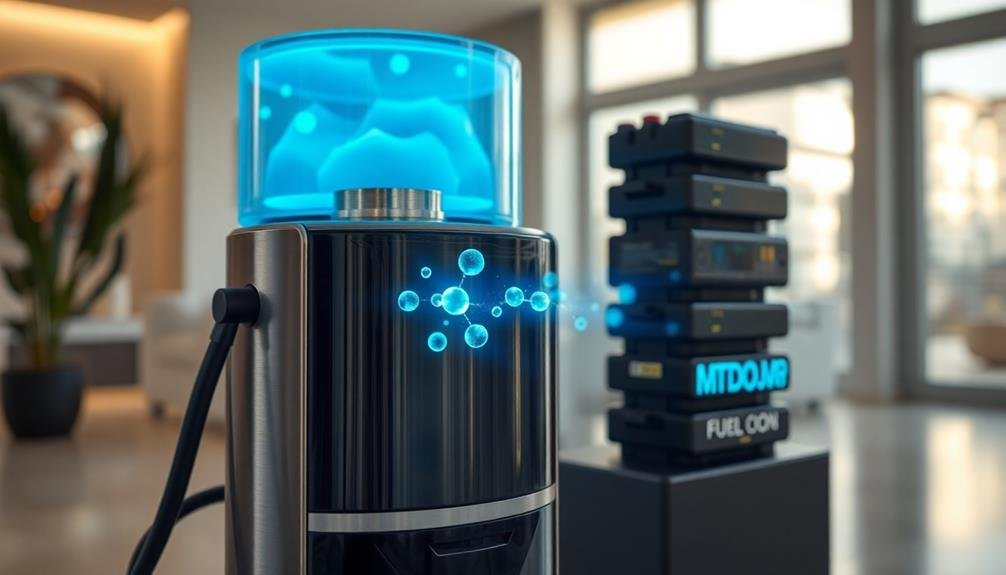
Fuel cells' unique ability to convert chemical energy directly into electricity makes them a promising technology for home energy systems. Unlike traditional combustion engines, fuel cells produce electricity through an electrochemical reaction, typically using hydrogen and oxygen. This process is highly efficient and generates only water and heat as byproducts, making it an environmentally friendly option.
You'll find various types of fuel cells, each with specific advantages. Proton exchange membrane (PEM) fuel cells are commonly used in residential applications due to their low operating temperature and quick start-up time. Solid oxide fuel cells (SOFCs) offer higher efficiency but require higher temperatures to operate.
When you're considering fuel cells for your home, you'll need to understand their key components: the anode, cathode, and electrolyte. The anode oxidizes the fuel, while the cathode reduces the oxidant. The electrolyte facilitates ion transfer between these electrodes.
Fuel cells can provide a constant source of power as long as fuel is supplied, making them an excellent complement to intermittent renewable energy sources like solar or wind power.
Battery Systems for Home Energy
You'll find various types of home battery systems available, including lithium-ion, lead-acid, and flow batteries.
Each type offers different capacity and power output options, ranging from a few kilowatt-hours to tens of kilowatt-hours.
When choosing a battery system for your home, you'll need to evaluate your energy needs, budget, and the space available for installation.
Types of Home Batteries
When considering battery systems for home energy, you'll find several types available on the market. The most common are lead-acid, lithium-ion, and flow batteries. Each has its own advantages and drawbacks.
Lead-acid batteries are the oldest and most affordable option. They're reliable but have a shorter lifespan and lower energy density compared to newer technologies. You'll need to maintain them regularly and replace them more frequently.
Lithium-ion batteries are increasingly popular for home energy storage. They're lightweight, efficient, and have a longer lifespan than lead-acid batteries. You'll get more cycles and better depth of discharge, but they come at a higher initial cost.
Flow batteries are a newer technology that offers long-term storage capabilities. They use liquid electrolytes stored in separate tanks, allowing for easy scaling of capacity. You'll benefit from their long lifespan and ability to fully discharge without damage, but they're currently more expensive and less compact than other options.
When choosing a battery system, consider factors like capacity, power output, efficiency, and cost. Your specific energy needs and budget will determine the best option for your home.
Capacity and Power Output
Kilowatt-hours and watts are the key metrics you'll need to understand when evaluating battery systems for home energy. Kilowatt-hours (kWh) measure the total energy capacity of a battery, while watts (W) indicate its power output. A typical home battery system might offer 10-15 kWh of capacity, enough to power essential appliances for several hours during an outage.
When selecting a battery, consider your home's average daily energy consumption and peak power demands. You'll want a system that can store enough energy to meet your needs and deliver sufficient power during high-demand periods. Most residential batteries provide 5-10 kW of continuous power, with the ability to surge higher for brief periods.
It's vital to match your battery's capacity and power output to your home's requirements. Undersizing can lead to insufficient backup power, while oversizing may result in unnecessary costs.
Factor in your energy goals, such as covering nighttime usage or achieving complete grid independence. Remember, you can often scale your system by adding multiple batteries, allowing for future expansion as your energy needs grow.
Synergy of Fuel Cells and Batteries
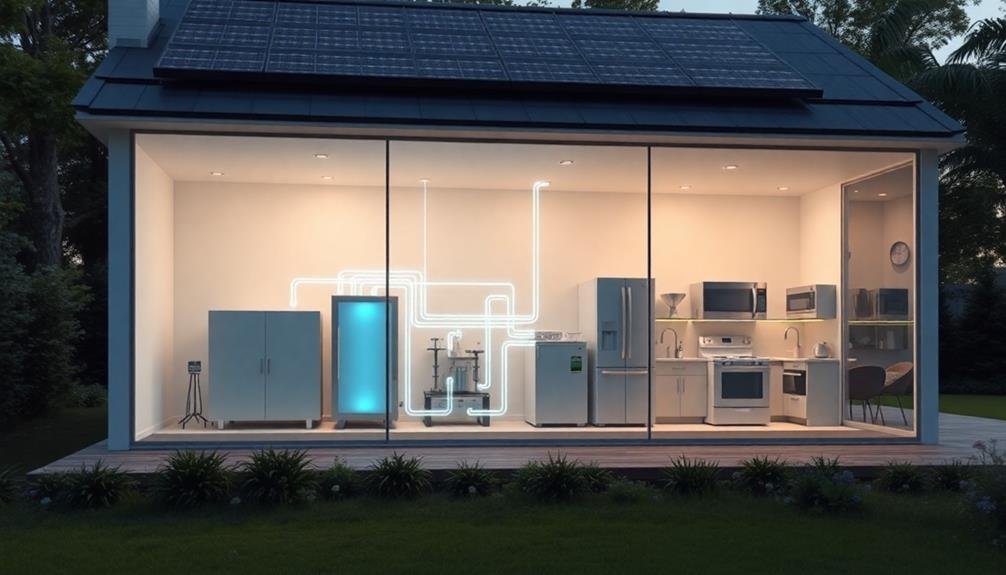
You'll find that fuel cells and batteries work together seamlessly in home energy systems, each compensating for the other's limitations.
Their complementary energy storage capabilities allow for a more reliable and efficient power supply throughout your home.
Complementary Energy Storage
The synergy between fuel cells and batteries creates a powerful combination for home energy storage. You'll find that these technologies complement each other perfectly, addressing the weaknesses of each individual system.
Fuel cells provide consistent, long-term power generation, while batteries excel at handling sudden power demands and storing excess energy.
When you integrate fuel cells with batteries, you're creating a robust and flexible energy solution for your home. The fuel cell acts as a steady power source, continuously generating electricity from hydrogen or natural gas.
Meanwhile, the battery system steps in during peak demand periods, supplying additional power when needed. It also stores excess energy produced by the fuel cell during low-demand times.
This complementary setup guarantees you have reliable power 24/7, even during grid outages. You'll benefit from reduced reliance on the traditional power grid, potentially lowering your energy costs.
Additionally, this combination can support the integration of renewable energy sources like solar panels, further enhancing your home's energy independence and sustainability.
Load Balancing Capabilities
Load balancing shines as a key advantage when combining fuel cells with batteries for home energy systems. You'll find that this hybrid setup allows for seamless management of power supply and demand fluctuations throughout the day.
Fuel cells provide a steady, consistent power output, while batteries can quickly respond to sudden spikes in energy needs. During peak hours, when your household's energy consumption is at its highest, the battery can discharge to supplement the fuel cell's output. This prevents overloading the fuel cell and guarantees a stable power supply.
Conversely, during low-demand periods, excess energy from the fuel cell can be used to recharge the battery, maximizing overall system efficiency.
You'll also benefit from improved grid stability. By balancing your home's energy needs internally, you'll reduce strain on the public power grid during high-demand times. This load-balancing capability not only enhances your energy independence but also contributes to a more resilient and reliable community power infrastructure.
Additionally, it allows you to potentially take advantage of time-of-use electricity rates, optimizing your energy costs by drawing from the grid when prices are low and relying on your hybrid system during expensive peak hours.
Enhanced Energy Independence
Embracing a combined fuel cell and battery system for your home can greatly boost your energy independence.
You'll reduce your reliance on the grid and have more control over your energy supply. This setup allows you to generate and store your own power, making you less vulnerable to grid outages or price fluctuations.
With a fuel cell and battery combination, you're not just consuming energy; you're actively producing it. You can use natural gas or hydrogen to power your fuel cell, which continuously generates electricity.
The battery stores excess energy for later use, ensuring you have power even when the fuel cell isn't operating at full capacity.
Here's how this system enhances your energy independence:
- Continuous power generation through fuel cells
- Energy storage in batteries for use during peak demand
- Reduced dependence on the grid for everyday needs
- Ability to operate off-grid during power outages
This level of energy independence gives you peace of mind and potentially lowers your long-term energy costs.
You'll have a reliable power source that's less affected by external factors, allowing you to maintain your lifestyle even during grid disruptions.
Increased Power Output and Reliability
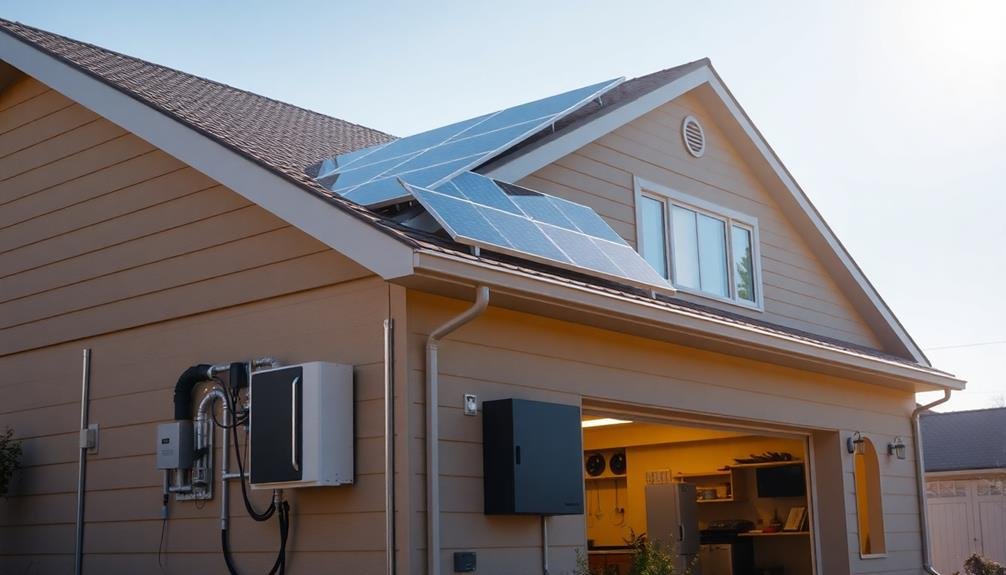
While fuel cells and batteries each have their strengths, combining them creates a powerhouse system that considerably boosts your home's power output and reliability.
You'll benefit from the continuous electricity generation of fuel cells and the quick response time of batteries, ensuring a steady and robust power supply.
Fuel cells provide a consistent baseline of power, while batteries can handle sudden spikes in demand. This combination allows you to power more energy-intensive appliances and electronics without worrying about overloading your system. During peak usage times, the batteries can supplement the fuel cell's output, preventing any drops in voltage or power quality.
The hybrid system also enhances reliability. If your fuel cell experiences any issues, the batteries can seamlessly take over, preventing outages. Conversely, if the batteries are depleted, the fuel cell continues to generate electricity. This redundancy considerably reduces the risk of complete power loss in your home.
Moreover, you can optimize power generation and storage based on your specific needs and energy consumption patterns, ensuring maximum efficiency and minimizing waste.
The result is a more powerful, dependable, and flexible home energy system that adapts to your lifestyle.
Improved Efficiency in Energy Storage
Combining fuel cells with batteries offers three key advantages for energy storage efficiency in your home.
First, you'll benefit from the fuel cell's continuous power generation, which complements the battery's ability to store excess energy. This synergy allows for a more efficient use of generated electricity, reducing waste.
Second, you're able to optimize energy distribution based on your household's needs, using stored power during peak demand and relying on fuel cells during off-peak hours.
Third, this combination enhances your overall system's longevity. Batteries aren't constantly cycled, which extends their lifespan, while fuel cells operate more consistently, improving their efficiency.
The integrated system also provides:
- Reduced reliance on the grid
- Lower energy costs over time
- Increased energy independence
- Better management of renewable energy sources
You'll find that this hybrid approach maximizes the strengths of both technologies while minimizing their individual weaknesses.
It's a smart way to guarantee your home has a reliable, efficient, and sustainable energy storage solution. By leveraging the complementary nature of fuel cells and batteries, you're investing in a more robust and flexible energy system for your household.
Cleaner and Greener Home Energy
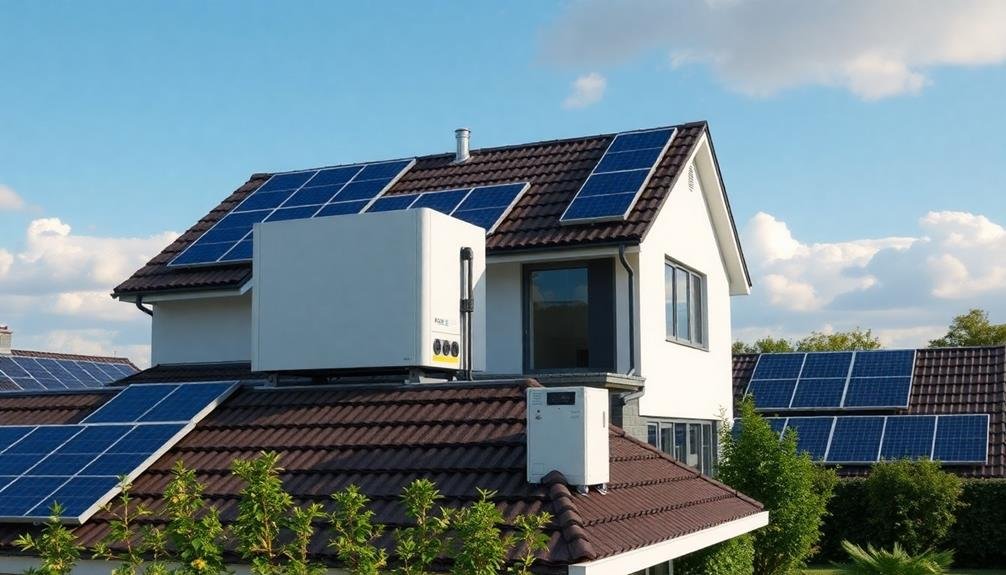
The integration of fuel cells and batteries in your home energy system leads to a remarkable cleaner and greener power solution. This combination considerably reduces your carbon footprint by minimizing reliance on fossil fuels. Fuel cells produce electricity through a chemical reaction, typically using hydrogen or natural gas, resulting in lower emissions compared to traditional power sources.
When paired with batteries, they create a more sustainable and efficient energy ecosystem. You'll benefit from reduced air pollution and improved indoor air quality, as fuel cells emit only water vapor and small amounts of carbon dioxide.
This hybrid system also decreases your dependence on the grid, which often relies on coal or natural gas power plants. By generating and storing your own clean energy, you're contributing to a healthier environment for your community.
Moreover, the fuel cell-battery combination supports the integration of renewable energy sources like solar and wind. You can store excess energy from these intermittent sources in your batteries, further enhancing the sustainability of your home energy system.
This approach aligns with global efforts to shift towards cleaner energy solutions and combat climate change.
Cost-Effectiveness Over Time
You'll find that combining fuel cells with batteries for home energy offers significant long-term savings potential.
As you use this integrated system, you'll experience reduced energy bill fluctuations, providing more predictable monthly costs.
Over time, these savings and stability can offset the initial investment, making it a cost-effective choice for your home's energy needs.
Long-Term Savings Potential
How does the initial investment in a fuel cell-battery hybrid system pay off over time? While the upfront costs may seem challenging, you'll find that the long-term savings potential is substantial. As energy prices continue to rise, your hybrid system will shield you from these increases, providing a stable and predictable energy source for your home.
You'll experience significant savings through:
- Reduced reliance on the grid
- Lower maintenance costs compared to traditional systems
- Increased energy efficiency and reduced waste
- Potential income from selling excess energy back to the grid
Over time, you'll recoup your initial investment through lower monthly energy bills. The fuel cell component provides a consistent baseline of power, while the battery storage allows you to optimize your energy usage and take advantage of off-peak rates.
This combination results in a more efficient and cost-effective system overall. As technology improves and production scales up, the costs of fuel cells and batteries are expected to decrease, making the long-term savings even more attractive.
You'll also benefit from potential tax incentives and rebates, further offsetting the initial investment and accelerating your return on investment.
Reduced Energy Bill Fluctuations
Stability in energy costs becomes a reality with a fuel cell-battery hybrid system. You'll experience fewer fluctuations in your monthly energy bills, as this setup allows you to rely less on the grid during peak hours when electricity rates are highest. By generating and storing your own power, you're shielded from sudden price spikes and seasonal variations in utility costs.
The fuel cell provides a consistent baseline of power, while the battery system stores excess energy for use during high-demand periods. This combination enables you to optimize your energy usage and minimize reliance on expensive grid power. Here's a comparison of energy bill fluctuations:
| Month | Traditional Grid | Fuel Cell-Battery Hybrid |
|---|---|---|
| January | $150 | $110 |
| April | $120 | $105 |
| July | $200 | $120 |
| October | $130 | $105 |
| December | $180 | $115 |
As you can see, the hybrid system offers more consistent monthly costs, eliminating the shock of unexpectedly high bills. This predictability helps you budget more effectively and reduces financial stress associated with energy consumption. Over time, you'll appreciate the peace of mind that comes with stable, manageable energy expenses.
Scalability for Various Home Sizes
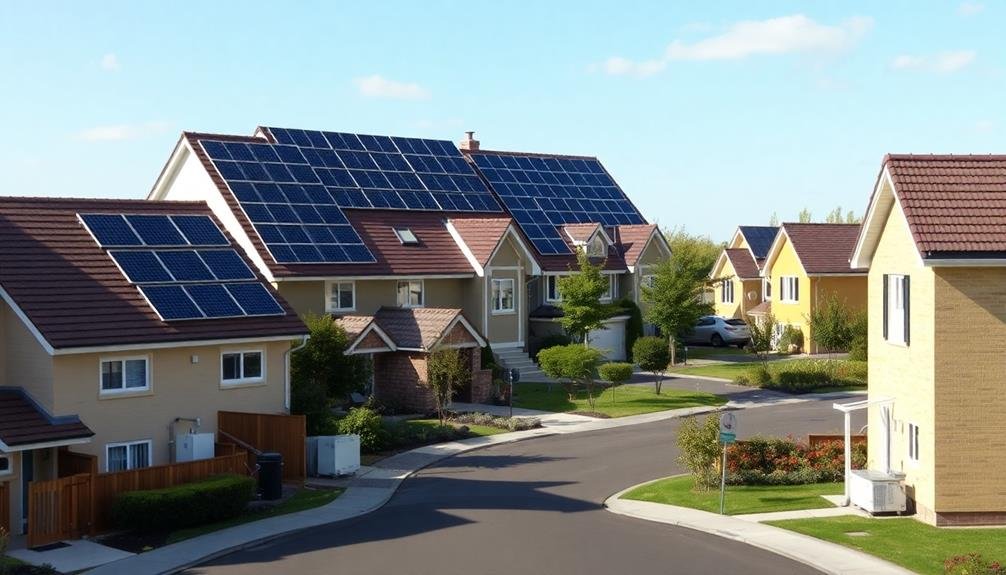
The scalability of fuel cell and battery combinations offers homeowners flexibility in meeting their energy needs across various property sizes. You can easily adjust the system's capacity to match your home's specific requirements, whether you're living in a small apartment or a large estate. This adaptability guarantees that you're not overpaying for unnecessary capacity or left with insufficient power.
When considering scalability, keep these key points in mind:
- Modular design: Fuel cell and battery systems can be expanded or reduced as needed.
- Customizable output: Tailor the power generation to your exact consumption patterns.
- Future-proofing: Easily upgrade your system as your energy needs change over time.
- Space efficiency: Compact units can fit into homes of all sizes without compromising living areas.
You'll find that these systems can be fine-tuned to provide peak performance for your unique situation.
Whether you're looking to power a few essential appliances or an entire smart home, the combination of fuel cells and batteries can be scaled accordingly. This flexibility not only guarantees efficient energy use but also maximizes your investment by providing a solution that grows with your needs.
Smart Grid Integration Possibilities
While scalability guarantees your home's energy needs are met, integrating fuel cell and battery systems with smart grids opens up a world of possibilities.
You'll be able to participate in demand response programs, selling excess energy back to the grid during peak hours. This not only helps stabilize the grid but also provides you with additional income.
Smart grid integration allows for real-time monitoring and optimization of your energy consumption. You can program your system to charge batteries when grid electricity is cheapest and use stored energy during high-demand periods. This intelligent energy management can greatly reduce your electricity bills.
With two-way communication between your home system and the grid, you'll receive instant updates on grid status, pricing, and potential outages.
Your fuel cell and battery combination can seamlessly switch to island mode during blackouts, ensuring uninterrupted power supply. Additionally, you can contribute to grid stability by allowing your utility to draw from your stored energy during emergencies or extreme demand spikes.
This level of integration transforms your home into an active participant in the broader energy ecosystem, promoting efficiency and reliability on both individual and community levels.
Future of Residential Energy Systems
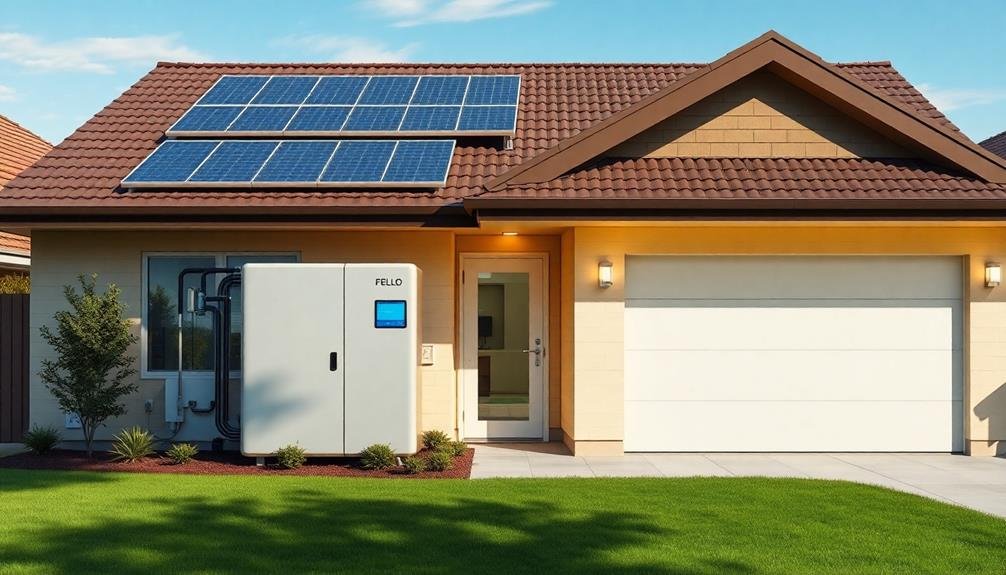
Looking ahead, residential energy systems are poised for significant transformation. You'll likely see a shift towards more integrated and intelligent home energy solutions that combine multiple technologies. The synergy between fuel cells and batteries will play an essential role in this evolution, offering increased reliability, efficiency, and sustainability.
As you consider the future of residential energy, keep these key developments in mind:
- Advanced energy management systems
- Increased adoption of renewable energy sources
- Improved energy storage capabilities
- Greater emphasis on energy independence
You'll witness a growing trend towards smart homes that can automatically optimize energy usage based on your habits and preferences. Expect to see more homes equipped with solar panels, wind turbines, and geothermal systems working in tandem with fuel cells and batteries.
This combination will allow you to store excess energy and use it during peak demand periods or power outages. The future of residential energy systems will also focus on reducing carbon footprints and increasing self-sufficiency.
You'll have more control over your energy production and consumption, potentially even selling excess power back to the grid or sharing it with neighbors in micro-grid setups.
Frequently Asked Questions
How Long Does It Take to Install a Combined Fuel Cell-Battery System?
You'll find installation times vary depending on your home's setup. Typically, it'll take 1-3 days for professionals to install a combined fuel cell-battery system. They'll handle electrical connections, plumbing, and safety checks during this process.
Are There Any Safety Concerns With Having Fuel Cells in Residential Areas?
You should be aware of safety concerns with residential fuel cells. They're generally safe but require proper installation and maintenance. You'll need to guarantee proper ventilation, handle hydrogen carefully, and follow all manufacturer guidelines and local regulations.
Can Existing Homes Be Retrofitted With This Combined Energy System?
Yes, you can retrofit existing homes with a combined fuel cell and battery system. You'll need to evaluate space requirements, electrical modifications, and local regulations. It's best to consult with a professional installer for a personalized assessment and implementation plan.
What Maintenance Is Required for a Fuel Cell-Battery Home Energy System?
You'll need to regularly inspect and clean your fuel cell, replace filters, and monitor battery health. You should also schedule professional maintenance annually. Don't forget to check electrolyte levels and top up water in the fuel cell periodically.
How Does Weather Affect the Performance of Fuel Cells for Home Energy?
Weather doesn't greatly impact fuel cell performance for your home energy. They'll work reliably in most conditions. However, extreme temperatures can slightly affect efficiency. You'll want to guarantee proper insulation and ventilation for ideal operation year-round.
In Summary
You've seen how combining fuel cells and batteries can revolutionize your home's energy system. You'll enjoy greater independence, reliability, and potential cost savings. As you consider this innovative approach, remember it's scalable and adaptable to your needs. With smart grid integration on the horizon, you're looking at the future of residential power. Embrace this technology, and you'll be at the forefront of sustainable, efficient home energy solutions.

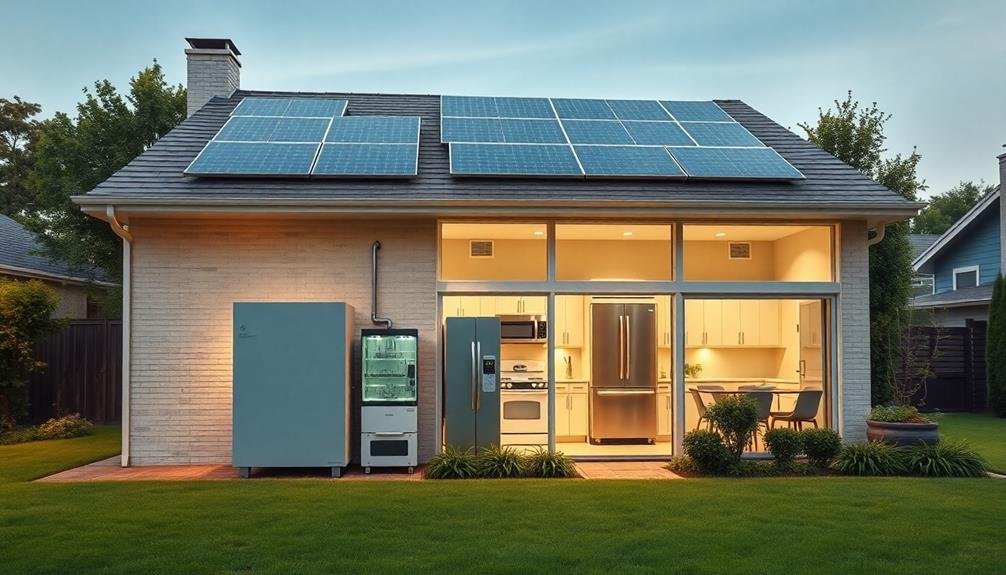
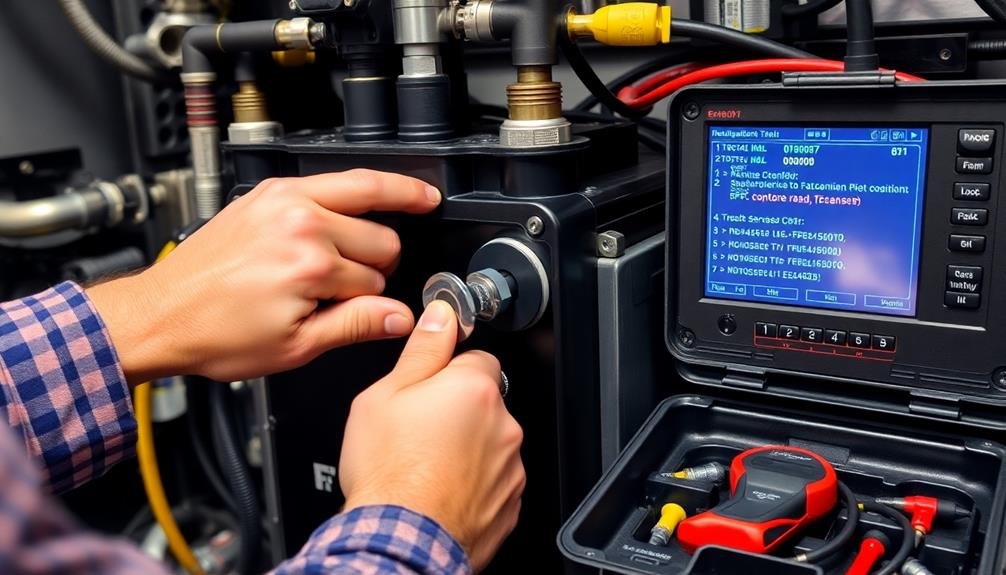
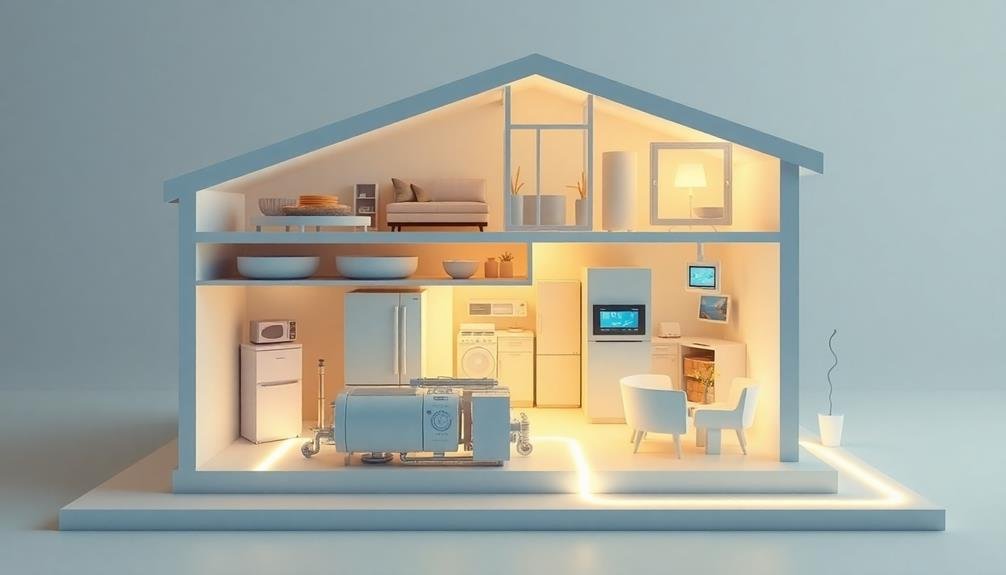
Leave a Reply